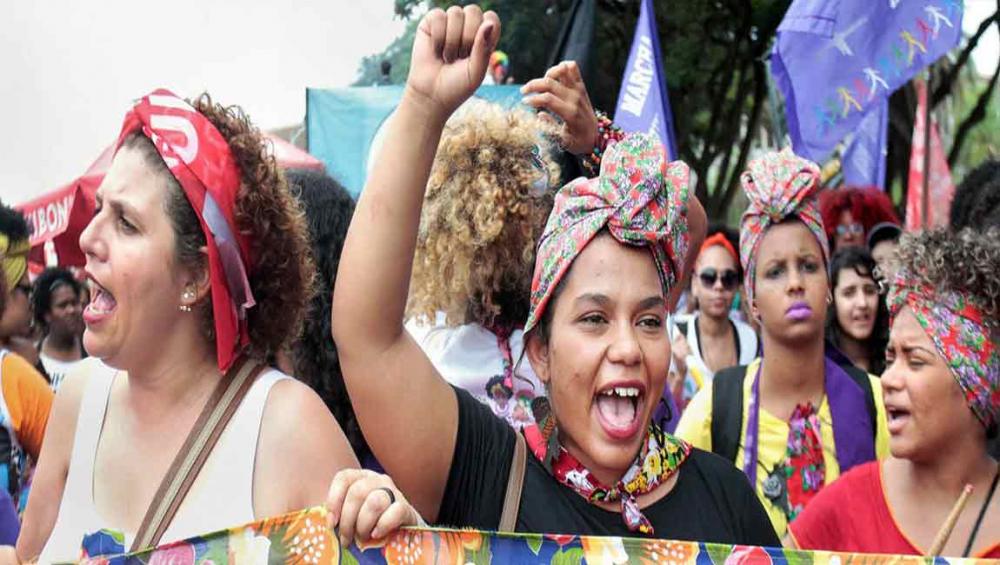Just Earth News | @JustEarthNews | 10 Mar 2018

UN Women/Bruno Spada
New York: This year, International Women’s Day comes at a pivotal moment, and with a wave women’s activism – from the #MeToo movement to #TimesUp and beyond – exposing the structures that have allowed women's oppression to flourish, the United Nations is urging the world to stand with rural and urban women activists to topple the remaining barriers to gender equality and empowerment.
“The historical and structural inequalities that have allowed oppression and discrimination to flourish are being exposed like never before,” Secretary-General António Guterres said in his message on the Day, marked annually on 8 March.
From Latin America to Europe to Asia, on social media, on film sets, on the factory floor and in the streets, women are calling for lasting change and zero tolerance for sexual assault, harassment, and discrimination of all kinds, said the UN chief, declaring that achieving gender equality and empowering women and girls “is the unfinished business of our time, and the greatest human rights challenge in our world.”
“The activism and advocacy of generations of women has borne fruit,” he continued. “There are more girls in school than ever before; more women are doing paid work and in senior roles in the private sector, academia, politics and in international organizations, including the United Nations.”
However, some remaining serious obstacles include that more than a billion women lack legal protection against domestic sexual violence; over the next decade millions more girls will undergo genital mutilation; and women’s representation in parliaments stands at less than one quarter – and even lower in boardrooms.
“Where laws exist, they are often ignored, and women who pursue legal redress are doubted, denigrated and dismissmantled,” he lamented.
Noting that the UN should “set an example for the world,” Guterres recognizes that this is not always the case.
He did, however, point out some changes to address it, saying “We have now reached gender parity for the first time in my senior management team, and I am determined to achieve this throughout the Organization.”
Totally committed to zero tolerance of sexual harassment, Guterres added the UN’s plans to improve reporting and accountability, elaborating how the Organization is working globally to prevent and address sexual exploitation and abuse by staff in peacekeeping missions.
“We at the United Nations stand with women around the world as they fight to overcome the injustices they face – whether they are rural women dealing with wage discrimination, urban women organizing for change, women refugees at risk of exploitation and abuse, or women who experience intersecting forms of discrimination,” maintained the Secretary-General.
Noting that women’s empowerment is at the heart of the 2030 Agenda, he affirmed that progress on the Sustainable Development Goals (SDGs) means “progress for all women, everywhere.”
“Gender inequality and discrimination against women harms us all,” he underscored, saying that that gender equality “is not a favour to women,” but a human rights issue in everyone’s interests.
He asserted that investing in women lifts up communities, companies and countries.
“Women’s participation makes peace agreements stronger, societies more resilient and economies more vigorous,” he detailed, adding that discrimination against them is “detrimental to all.”
The UN chief stressed the need for transparency and accountability if women are to reach their full potential to lift up communities, societies and economies.
“Stand with women, listen to them and learn from them,” Guterres urged.
Time is Now: Rural and Urban Activists Transforming Women’s Lives
In her message for the Day, Phumzile Mlambo-Ngcuka, Executive Director of UN Women explained that this year’s theme captures the life of the women activists whose passion and commitment have brought change over generations and won women’s rights.
“What we see today is a remarkable gathering of strength among women all over the world, demonstrating the power of speaking with one voice, as they call for opportunity and accountability, drawing momentum from grassroots networks and coalitions that stretch right up to government leadership,” she said.
She credited feminist leaders, spotlighting Asma Jahangir of Pakistan and UN Women’s Regional Goodwill Ambassador for Africa Jaha Dukureh of the Gambia for their powerful work.
She pointed out that healthy societies have a mix of voices that provide checks and balances – important for good decision-making – and saluted those who speak out for justice.
“We commend the women who spoke out in the International Criminal Court where their testimonies have held to account those who used rape as a weapon of war,” Ms. Mlambo-Ngcuka asserted.
“We celebrate activists who campaigned for equal rights for lesbian, gay, bisexual, transgender and intersex people, and we recognize those who advocated for legal reform,” she added.
The feminist movement must continue to increase its diversity to support and shape the agenda – including young men and boys, who will learn to value and respect women and girls and change the way men behave.
Recognizing the power of stereotypes to influence how people are valued, she held sway that a movement of women that can address these issues is critical, “but we also need a movement of male feminists” as a means to alter the way women are heard and seen.
“Today’s activists must empower those most likely to be left behind, the majority of whom are women, as our latest report, Turning Promises into Action reveals,” she said.
She encouraged stronger support for women’s political activism and a broader space for their civil society voices as a combined effort will better target those who need change most.
“The culture of gender-based poverty, abuse and exploitation has to end with a new generation of equality that lasts,” Ms. Mlambo-Ngcuka concluded.